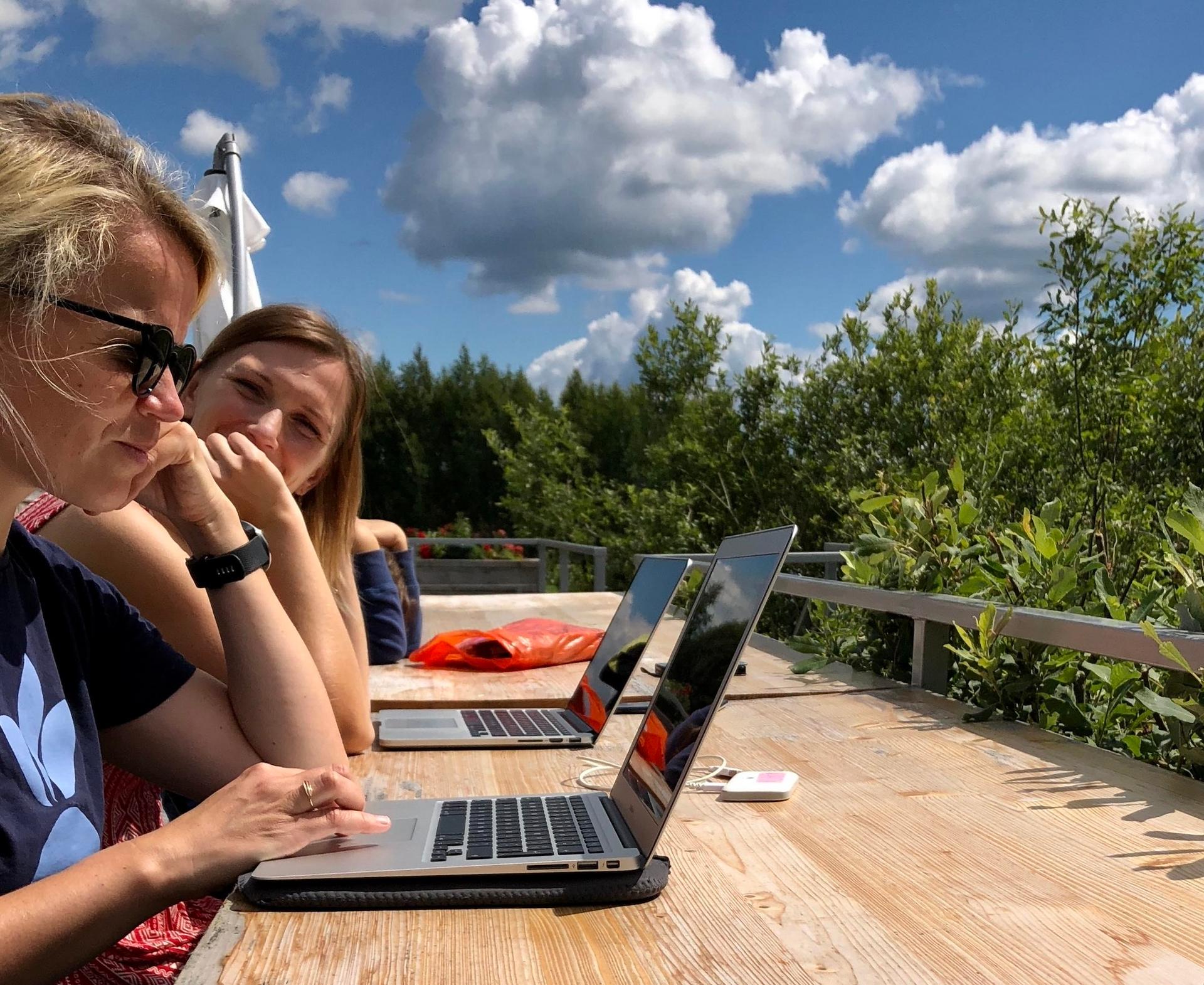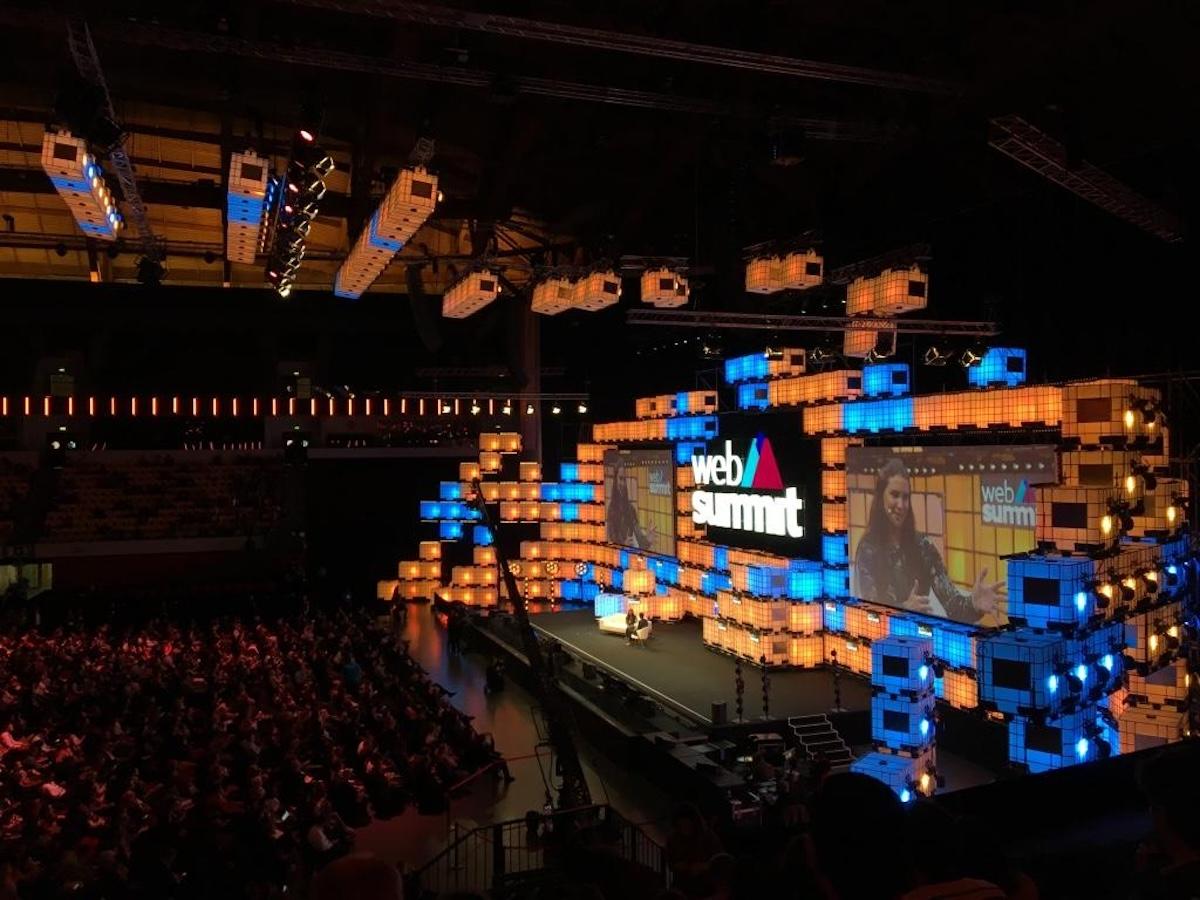Tech, hope and inspiration – Wunderer takeaways from WebSummit 2020

Late 2020, our Delivery Manager Eeva and a couple of other Wunderers attended the online version of WebSummit. And even if the event does have a time-stamp, the learnings from it are still valid and worthy to reread now and then.
I have attended WebSummitOpens in a new tab – the leading tech conference – twice on-site in Lisbon together with a few colleagues in 2017 and 2018. For me, it has always been an inspiring event where I can hear about the newest thoughts from the industry leaders, learn something new and spend some quality time with my dear colleagues in a non-work-related setup. This year, like many other things, the setup was quite different as the whole massive conference was arranged online. I and a couple of other Wunderers had a chance to attend the 2020 online version of WebSummit and we are happy to share our takeaways.
Conference experience online
Despite the fact that I myself prefer attending events on-site, there were definitely some benefits from the conference happening online. For example, it was way easier to switch between sessions, if one didn’t find something as interesting as expected. Also, the schedule was much more on point. However, attending online, it was very easy to over-schedule the whole evenings so that you basically would not have any proper breaks in between. There were so many interesting topics to follow that I ended up attending a total of 58 sessions during the three nights! Note to self: next time, schedule for some breaks as well!
Also, all of the speakers were attending the conference remotely. Some speakers had arranged themselves proper home studios; others used just their laptops as microphones which sometimes caused some troubles in hearing what they were saying. (Next time, dear WebSummit, please arrange at least proper headsets for all the speakers.) But all in all, everything was pretty decently arranged, and despite the unusual format, it was an event worth attending.
The current buzz-topics
So what kind of topics were the hottest ones in this year’s WebSummit? Well, there was a lot of talk about IoT (Internet of Things), fintech (technologies in finance), gadgets, startups, social media topics, space tech, developer talks and many, many more. But as a delivery manager, coordinating project teams, I was surely interested in the sessions related to remote team management and leadership. We at Wunder have been putting a lot of effort lately to our teams’ wellbeing and creating Psychological safety in our company, so getting more insight on these topics was definitely on my agenda.
On a more personal level, I found the green tech and AI-related sessions also very inspiring. Green values are very close to my heart, and I wanted to hear how technology could help us tackle the hazards our dear Earth is facing these days. Also, I wanted to find out where is the development of Artificial Intelligence heading, how will the ethical issues related to it be solved, and how could we utilise it in the future.
So here are some of the highlights from the conference:

WfH/Remote working – the struggles and the benefits
Mike Schroepfer, CTO of Facebook, pointed out that last spring you couldn’t buy toilet paper, but you had the internet. No-one would have believed this situation 20 years ago! So it totally makes sense that there is an acronym for Working from Home (WfH) these days.
In many of the Roundtable sessions people centricity, empathy, meaning and responsibility were mentioned as the key aspects for businesses withstanding the current Covid-19 pandemic the best. Putting extra effort to equality and inclusion leads towards higher Psychological safety, which is more important these days than ever.
On top of WfH I added a few more new terms to my vocabulary:
- Anticipatory anxiety means that our baseline anxiety can be on such a high level, that things that didn’t affect us before may appear stressful or even scary.
- Many people are suffering from Terminal uniqueness – a feeling that only I feel this bad, and there is no-one who could help me.
- Kognitive fitness means that you are able to focus, think clearly and have empathy. The lack of it, on the other hand, would mean stress, anxiety and even burnout.
To lower the possibility for stress, anxiety and burnout, Padmasree Warrior, the Founder & CEO of FableOpens in a new tab shared the following thoughts on how to take care of our minds. These tips are especially useful for those who suffer from digital noise as a major stress factor:
- Dedicate a small moment every day to your mental health – the same way as you do for your body!
- Think what is digital nutrition vs. digital junk to you. Social media is not necessarily so bad if you curate it (choose carefully what/who you want to follow).
- Read a book for at least 15 minutes every day. 30 minutes of fiction reading daily may extend your life for 2 years!
This pandemic has been and still is a grande, global, unfortunate chain-reaction. Still, for some, it has provided a possibility to slow down and rethink their lives. The world-known superstar DJ David Guetta was actually super happy that this quarantine time had let him concentrate fully on what he loves – making good music – instead of running around doing shows and trying to manage to make a few new songs every now and then, in between his world tours.
For us Wunderers this WfH time has shown that we have been ahead of our time. There were actually not that many practical, new-to-me takeaways from these WebSummit sessions. As we have been working partially remotely for years already, the shift to Virtual-first way of working was not such a big leap for us. Of course, this doesn’t mean that we wouldn’t have room for further improvement. Perhaps something to think about, for example, could be arranging inspiring external speakers for our common online get-togethers more regularly. I’ve really enjoyed having public speakers, like neuroscientist Katri Saarikivi on empathy or actor-psychotherapist Kari Ketonen on dealing with pressure, discussing this kind of very important topics with us and our stakeholders.
Leading through the pandemic
For all of us, but especially for leaders, it is important to realise that people get distant and increasingly indifferent as the period of remoting gets longer. It takes conscious effort to keep employees engaged and motivated. A motivating mission creates commitment and trust. So the leaders’ ability to communicate the purpose of a company is even more vital, as now many of us have had some time to reflect what really matters to us, what is actually essential or less important in our lives. And if the purpose that our company serves is not in accordance with our own values, this may lead to some unpleasant outcomes (from the company’s perspective). It is as well important to think about employees’ purpose and role in the company, in the project, in the meeting…
Likewise, the clients – especially the younger generations – these days want to know how you treat your people. Consumers want companies to work in a way that is meaningful to them and this is why brand reputation is so increasingly important. A great quote I picked up from one of the sessions was that “If you claim to be a people-first-company, your employees’ well-being should be one of your KPIs!”
One study states that in the post-pandemic future only 12% of knowledge workers want to return fully to office-work, whereas 72% want some kind of a hybrid model. This means that in the future, office spaces will be rather collaborative spaces instead of places where people would go to sit separately doing their work in solitude. I’m happy that this is also reflected in my work at Wunder, as our Helsinki office is moving to a more versatile office space. There is more room for people to come together to connect and make decisions and then work productively separately without so many interruptions, perhaps from home or some other remote locations.
Green-tech
Climate change, loss of wildlife and how to tackle these global crises with data and technology was very profoundly present in the conference. Many speakers pointed out that companies shouldn’t see sustainability only as a cost, as usually considering sustainability in decision making, it actually reduces “waste” and expenses in the long run. Also, the environment should be treated as a major stakeholder when creating businesses or products.
There is an exciting open international community WILDLABS.NETOpens in a new tab. It consists of experts from different fields of science, industries and conservation organisations trying to tackle some of the biggest conservation challenges facing our planet. Go check it out!
Sometimes making greener choices and doing good is made really easy for us who are not able to go on the field and put our hands in the soil ourselves. An awesome example of this is a search engine called EcosiaOpens in a new tab. The company behind it uses all its profits to plant treesOpens in a new tab in places they are most needed. Using the service is free of charge – the income comes from search ads (like in Google) – it is privacy-friendly and more than CO2-neutral. I’ve used it now myself, and it seems to work pretty nicely. You can add this as your default browser and do good with absolutely no extra effort! Ecosia was founded in 2009 purely so that they could plant trees. I just love what their “Chief Tree Planting Officer”(!) Pieter Van Midwoud said about business models and capitalism: “Companies should be founded not to make money, but to do good.”

I also learned that CO2-footprint of all Google Cloud services is 0, and it is the cleanest Cloud ecosystem in the industry! The good news is that Wunders’ very own SILTA-environments run on Google Cloud! You can read more about our efforts on greener tech from a recent article by our Architecture wizard Janne.
By the way, Space-environmentalism is surging as well. This means, for example, that if even a modest kind of life would be found elsewhere in the solar system, it would need to be protected.
Neurotechnology and AI
As Artificial Intelligence and brain-computer interfaces are developing and being developed in huge leaps, digital human rights or “neuro rights” are becoming a more pressing topic.
The brain is an organ that generates one’s mind. If you change the brain, insert something there, the person adopts that idea or thought as a part of their own self. This could be a dangerous pattern to follow, and mental privacy or cognitive autonomy could be in danger. Hence, it is stated that this should be addressed as a basic human rights issue. The Universal Declaration of Human Rights was adopted in 1948, and at that time, it was hardly even imaginable where development of technology would lead us in the future. So the declaration definitely should be updated for the digital era, and there is an initiative by Columbia University for Neuro rights to be added into the Human rights declarationOpens in a new tab. In some countries, like Chile and Spain, this issue is already being tackled on a governmental and legislative level.
However, clearly, Neurotechnology is only one, futuristic way of influencing peoples’ minds. Every day we are already affected by different kinds of propaganda, fake news, deep fake videos and advertisements spread through the internet and social media. Even our dear gadgets shape the way things are presented to us. This is something we all need to acknowledge in our daily lives and understand why “digi-skills” are such an important topic for us to teach to our kids, too.
Lately, an “AI-designer” Nikolai managed to fool people for a whole yearOpens in a new tab making them think that it is actually a real person. Some were quite worried and even offended about this. On the other hand, the world-renowned author, spiritualist and alternative medicine advocate Deepak Chopra was “cloned” as a digital version of himself, “Digital DeepakOpens in a new tab”, who he sees as an extension of himself, a “Personal AI” including his values and goals, trained by him. He explains that this kind of technology is actually a part of human evolution. One of the companies, who had a showcase in WebSummit and who think that digital people can be used to enhance customer experience is Soul MachinesOpens in a new tab. They see avatars as a means of enhancing diversity and inclusion in customer support by creating e.g. highly personalised 24/7 support at scale.
This kind of technology also poses a significant threat to our society by enabling things like deepfake videos, which are really hard to distinguish. AI FoundationOpens in a new tab is one of the global entities trying to bring together the big companies working with artificial intelligence, establishing common practises for “Sustainable AI” and supporting non-profit organisations and R&D around the topic. According to the AI Foundation, half of their funding is used for non-profit initiatives to assure that also AI belongs to everyone in the future.
Some misc goodies
As I am Finn, proud of our small and somewhat unknown country, I want to bring up also the little bit of highlight we got in the summit: Aarno Palotie, Professor at the Center for Human Genome Research, was talking about mapping the whole genome of Finns in a project called “FinnGenOpens in a new tab” (which is actually one of the non-governmental organization clients of Wunder). The project is perhaps the largest and most ambitious genomic study in the world, researching 500 000 Finn’s genome and life history. The goal is to understand the genetic background of hereditary diseases in our isolated population to find better ways for medical care and prevention. The research is a collaborative effort of Finnish universities, hospitals, governmental organisations, The Finnish Red Cross Blood Service, biobanks and international pharmaceutical companies. Only the partners are allowed to use the individual data (due to GDPR and legislation), but the research findings are shared around the scientists’ community worldwide. Pretty cool!
Another cool takeaway was definitely from Benedict Evans, analyst and venture partner at Mosaic Ventures. He gave a breath-taking (especially in speed and amount of content!) presentation on trends in digital. Evans says that technology is becoming a systemically important part of society through the internet, PCs, smartphones and other gadgets. For example, 40 % of Americans have met online, and on-demand watching is already much more popular than normal TV-channels. His presentationOpens in a new tab can be found online on his website. Super-interesting!
While Benedict Evans was underlining how big of an impact IT already has, Wikipedia founder Jimmy Wales is already (again) ahead of others. About a year ago Wales launched a competing social media platform of his own. WT.SocialOpens in a new tab is fully financed through user donations instead of advertisements and focuses on quality of content instead of click-bites. I myself am yet to explore the possibilities of this platform but am definitely interested in digging deeper.
And last but not least, I heard a session by SuperstrataOpens in a new tab, a company which produces bikes and e-bikes from advanced carbon fibre composite materials, which are both super-lightweight (the average bike weighs only 1,3 kg!) and durable, 3D-printed in one piece. You can go to their website and try customising your own bike with your own measurements and riding-preferences – that’s pretty fun! And no, I’m not getting paid for this add – I just find their idea and products really cool! With the fact that bicycling is one of the very current megatrends and also a means for greener ways for commuting, I wanted you to know about Superstrata, too.

Looking forward
The 2020 WebSummit left me with a lot of inspiration and hope, as so many wonderful initiatives and projects are currently underway to make our world a better place for us and others living on this planet. Also, companies are clearly moving towards people-centricity and especially this unfortunate and burdening pandemic has proved that it is now more crucial than ever. So even if we still have to struggle with this unusual situation for a while, I hope I have managed to spread some of that inspiration, good news and positive vibes to you, too 🙂
The online version of the conference was pretty successfully arranged, yet nothing can beat Lisbon as the venue of such an event, and nothing can make up for the time we’d get to spend with our awesome colleagues during such events on-site. So I’m keeping my fingers crossed that this November we could again go to Lisbon to get the full WebSummit-experience!